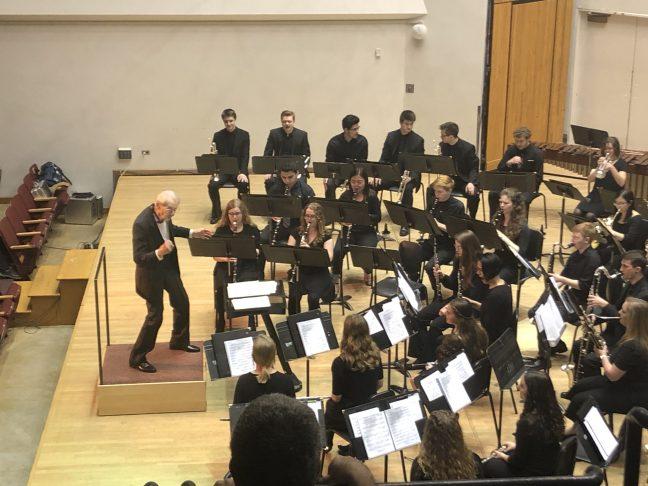While the masses are often swept up in the grandeur of the Spring Varsity Band Concert, Mike Leckrone’s final note was a tad more sentimental as he conducted the Concert Band Spring Concert this Sunday inside Mills Hall
While the somewhat dated facility is by no means glamorous, the opening of the Hamel Music Center this fall is expected to replace it as the go-to concert venue for the Mead-Witter school of music. This concert was likely one of the last for the ensemble inside the facility, which was a fitting way for Leckrone to end his time with the UW program.
While band transcriptions of excerpts from Italian opera and frantic symphonic poems seem far away from the popular tunes played by the march band, Leckrone’s final program was a fitting tribute to “beginnings and endings.”
While Leckrone told the audience this was the theme of the concert, I could not help but think of truly how autobiographical he made his final turn at the podium. His ability to blend genre was on high display throughout the afternoon, a skill he owes in part to his alma mater, Butler University.
“I could do a lot of different things,” Leckrone said, “There was nothing where you had to limit yourself to playing in the jazz band or playing in the concert band. I could play in everything and I did.”
Leckrone began the concert with a tribute to the man whose legacy he continued, Ray Dvorak. Known for programming many John Phillip Sousa marches, Dvorak led the UW Marching Band for more than 30 years prior to Leckrone’s tenure. Fittingly, Sousa’s “The Pathfinder of Panama” began the concert, with Leckrone still paying homage to the man that came before him.
The next few songs of the concert became highly personal, although this may not have initially been apparent to some in the audience. Leckrone took some time to explain the basic storyline of Andrea Chénier to the audience and note how he and his father used to love to listen to Italian opera together. Andrea Chénier paints a tragic love story between a French revolutionary and his lover, Maddalena, who chooses to put her name on the executioner’s list when he is condemned to death.
With repeated mentions of his late wife Phyllis throughout the afternoon, it wasn’t hard to suppose perhaps Leckrone placed Phyllis in Maddalena’s shoes in his mind. This sentiment carried over to his next pick, Percy Grainger’s “Australia Up Country Song,” which he said was one of his wife’s personal favorites. A simple folk tune pervaded in the piece, and its beauty was noticed and appreciated.
Leckrone still holds her dearly in his life, and she is central to many of his proudest personal moments.
“My proudest personal moment would have to be the fact that I think I got the approval of my wife at the time [to direct the Wisconsin Bands]” Leckrone said, “It was a very difficult life for her because band directors aren’t home a lot. For her at a moment to say ‘keep doing what you’re doing,’ that made me very proud.”
After a couple of lighthearted numbers by Camille Saint-Saëns and William T. Purdy, the penultimate tune served as the climax of the performance. After a reading of “Do not go gentle into that good night,” Elliot del Borgo’s tune inspired by the poem filled the rafters of Mills Hall. Simarly, an energetic rendition of Henry Fillmore’s “His Honor” capped off the official program.
With remarks from Susan Cook, director of the Mead-Witter School of Music, and professor Scott Teeple, Leckrone’s embodiment of the Wisconsin Idea was heavily stressed. By circulating UW’s music throughout the state, Leckrone made Wisconsin his classroom and continued to craft a legacy for his program beyond Madison’s confines, extending the values of the university to all who heard them play.
I recalled as I listened that I was first introduced to the university not by friends, family or a college search engine, but rather listening to the marching band play at a parade when I was 10. That was likely the moment that solidified my desire to be a Badger. I was probably not the only person in the audience with a similar story, as I saw at least four generations of Badgers come to see Leckrone conduct one more time.
To its credit, the Concert Band did a great job executing Leckrone’s picks. While definitely underrepresented in our coverage from time to time, ensembles like this exist in abundance at the music school, and free concerts are available almost every weekend.
While the announcement of Leckrone’s successor, Corey Pompey, is too recent to determine which, if any, other ensembles he will lead, Pompey is certain to build off and expand Leckrone’s tradition much like Leckrone did with those of Dvorak. The venue and faces might change, but the vitality of Wisconsin’s music will continue to thrive.
After three encores, ending on a reprise of “Australia Up Country Song,” Leckrone stepped off the podium for the last time. A standing ovation lasted at least a minute before the audience started to file out.
“The Badger fans always express their appreciation,” Leckrone said. “And that makes you feel good.”


